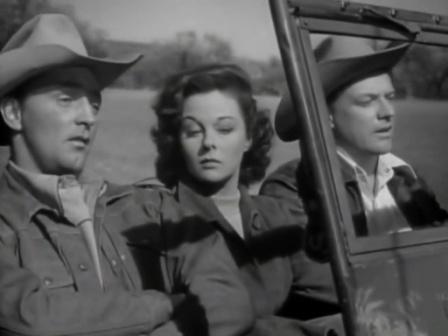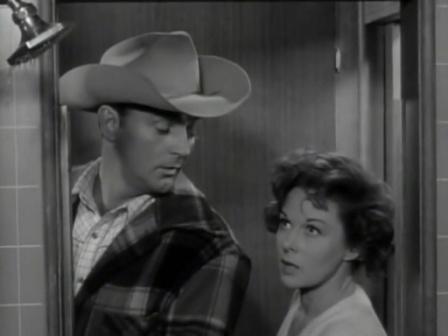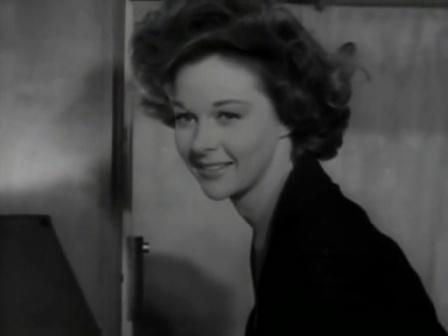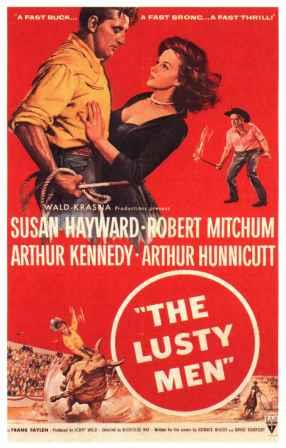A Fast Buck… A Fast Bronc… A Fast Thrill!
Here’s another example of somewhat misleading advertising. Given the title of 1952’s The Lusty Men, you’d expect lots of romance, sexual intrigue and the like. As is sometimes common in Hollywood the finished product has little relevance to the title.
But what a pleasant surprise The Lusty Men is! The movie is nothing less than a deep dive into the world of rodeoing, and even if you don’t have an affinity for the sport you’ll find the film entertaining and fun.
Robert Mitchum is Jeff McCloud, a champion rodeo rider whose been injured by being gored by a brahma bull. Giving up the sport as a result of the injury- the only thing he’s ever really known, he ambles about- finally returning to his family home.
He comes across Wes Merritt (Arthur Kennedy) and his wife Louise (Susan Hayward). Wes is a ranch hand with dreams of rodeoing full time. He’s eager but disillusioned by how much money he will need to purchase Jeff’s ancestral home for himself and Louise.
 In no time Jeff and Wes are as tight as white on rice and Jeff’s agreed to partner with Wes and help him learn the ropes of the rodeo circuit. With some misgivings Louise agrees and away they go.
In no time Jeff and Wes are as tight as white on rice and Jeff’s agreed to partner with Wes and help him learn the ropes of the rodeo circuit. With some misgivings Louise agrees and away they go.
In no time Wes is riding at a championship level but becomes slowly enamored with the lifestyle of a star rodeo rider. As he does so he pays Louise less and less attention as carousing, drinking, and even womanizing take on a great share of his time.
As time passes friction among this three person ad-hoc family unit of Mitchum, Hayward and Kennedy grows. Hayward becomes disconsolate at being ignored; Kennedy resentful of having to share his profits with Mitchum; and Mitchum grows envious seeing Kennedy enjoy what was his lifestyle. Mitchum also develops a thing for Hayward, or does he?
 Finally matters boil over and things come to a head. After being called out by Wes and spurned by Louise, Jeff ignores his injury and rides a rodeo. He does well for the first few events but takes a bad fall in his final one, fatally injuring himself. With Jeff’s death full in his face, Wes is pulled back to reality and realizes what is important.
Finally matters boil over and things come to a head. After being called out by Wes and spurned by Louise, Jeff ignores his injury and rides a rodeo. He does well for the first few events but takes a bad fall in his final one, fatally injuring himself. With Jeff’s death full in his face, Wes is pulled back to reality and realizes what is important.
He walks arm in arm with Louise away from the still ongoing rodeo, returning to the live he’d almost left behind forever.
There’s two things which make The Lusty Men so good. First is the deep dive into the world of rodeo. As Jeff and Wes travel from one rodeo to another, they encounter numerous people from Jeff’s past, most of them injured and maimed from their riding careers. Though there is ample stock footage used and the riding close-ups with the cast seem unrealistic, the balance of the picture shows a gripping and honest depiction of the industry.
 Second is the family component. Like many of director Nicholas Ray’s films, The Lusty Men has a strong family component. Here the theme is that no matter what happens, true families stick together and that no single person is stronger than the entire unit. Early on Jeff (probably) subconsciously finds himself back at his childhood home, only to become an appendage to Wes and Louise’s family shortly thereafter.
Second is the family component. Like many of director Nicholas Ray’s films, The Lusty Men has a strong family component. Here the theme is that no matter what happens, true families stick together and that no single person is stronger than the entire unit. Early on Jeff (probably) subconsciously finds himself back at his childhood home, only to become an appendage to Wes and Louise’s family shortly thereafter.
There’s also the almost brotherly guidance he provides Wes as he makes the rounds. Jeff exposes Wes to it all, though mostly with a word or two of caution. His play for Louise towards the end of the picture feels forced, almost as if Jeff really isn’t interested in her for himself, but rather to help force her back to Wes.
 And then there is Jeff’s last rodeo, where surely he knows he isn’t fit for competition and knows that his demise is imminent. But yet the message comes full circle as it is only Jeff’s death that shows Wes that that is his own fate as well. The message that it’s never too late to change comes through loud and clear.
And then there is Jeff’s last rodeo, where surely he knows he isn’t fit for competition and knows that his demise is imminent. But yet the message comes full circle as it is only Jeff’s death that shows Wes that that is his own fate as well. The message that it’s never too late to change comes through loud and clear.
Robert Mitchum is outstanding in his role as the spent cowboy looking for the next big thing. Though some would say he’s giving once of his sleepwalking performances here, (and perhaps he is) that sleepwalking is exactly what the role required. Jeff is supposed to be tired, aimless and broken.
 Susan Hayward doesn’t have many scenes to demonstrate her fire, except for one party sequence late in the action. Yet by the same token she embraces the domesticity of her role and embodies the glue that holds the little three person family together. Typical for the Hollywood, she’s constantly a bit overdressed for the rodeoman’s wife who lives in a RV. She’s emotes how she is torn between the two men, but not as potential love interests, but rather as loved family members who are both on the way to their own destruction.
Susan Hayward doesn’t have many scenes to demonstrate her fire, except for one party sequence late in the action. Yet by the same token she embraces the domesticity of her role and embodies the glue that holds the little three person family together. Typical for the Hollywood, she’s constantly a bit overdressed for the rodeoman’s wife who lives in a RV. She’s emotes how she is torn between the two men, but not as potential love interests, but rather as loved family members who are both on the way to their own destruction.
Arthur Kennedy is also strong as the quiet but ambitious rodeo rider. Though quiet we can see as the film progresses his frustrations simmer until the heat rises and the boil out in a frothy explosion. With every twitch of Kennedy’s mouth and scrunch of his eyes we can almost feel the personality of Wes coming through.
The Lusty Men is by far one of Mitchum’s better pictures at RKO. It’s rather hard to find more than superficial flaws in it. Yes, there’s perhaps a bit too much stock footage and perhaps Susan Hayward shouldn’t seem to be wearing evening gowns around her RV.
 There’s also little in the way of anything showing any training time between Jeff and Wes, but none was needed. My take on this perspective is that Wes was already pretty good at it (it’s clear early on that he’s snuck away to a few local ones before Jeff arrived) and that Jeff’s training role as part of their partnership is really about introducing him to the lifestyle.
There’s also little in the way of anything showing any training time between Jeff and Wes, but none was needed. My take on this perspective is that Wes was already pretty good at it (it’s clear early on that he’s snuck away to a few local ones before Jeff arrived) and that Jeff’s training role as part of their partnership is really about introducing him to the lifestyle.
If anything Jeff trained Wes in the life of the rodeo rider rather than how to ride better. Sad that it took Jeff’s death to finish the job.
